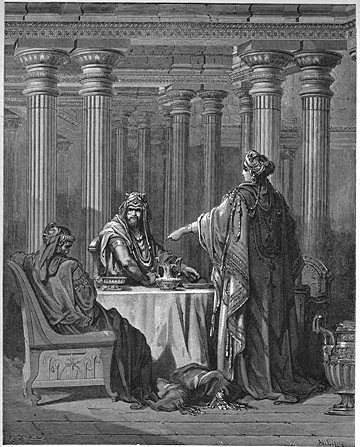Esther 7
1 So the king and Aman went in, to drink with the queen.
Ko ia naʻe haʻu ai ʻae tuʻi mo Hamani ki he kātoanga mo Eseta ko e tuʻi fefine.
2 And the king said to her again the second day, after he was warm with wine: What is thy petition, Esther, that it may be granted thee? and what wilt thou have done: although thou ask the half of my kingdom, thou shalt have it.
Pea naʻe toe lea ʻae tuʻi kia Eseta ʻi hono ua ʻoe ʻaho ʻi he kātoanga inu uaine, “Ko e hā hoʻo kole ʻe tuʻi fefine ko Eseta? Pea ʻe tuku ia kiate koe: pea ko e hā ia ʻa hoʻo kole? Pea ʻe fai ia ʻo aʻu ki hono vahe ua ʻoe puleʻanga.”
3 Then she answered: If I have found Favour in thy sight, O king, and if it please thee, give me my life for which I ask, and my people for which I request.
Pea lea ai ʻa Eseta ko e tuʻi fefine, ʻo ne pehē, “Kapau kuo u maʻu ʻae ʻofa ʻi ho ʻao, ʻE tuʻi, pea kapau ʻoku lelei ki he tuʻi, ke foaki ʻeku moʻui kiate au ʻi heʻeku kole, mo hoku kakai ʻi heʻeku tala:
4 For we are given up, I and my people, to be destroyed, to be slain, and to perish. And would God we were sold for bondmen and bondwomen: the evil might be borne with, and I would have mourned in silence: but now we have an enemy, whose cruelty redoundeth upon the king.
He kuo fakatau ʻakimautolu, Ko au mo hoku kakai, ke maumauʻi, mo tāmateʻi, pea ke fakaʻauha. Pea ka ne fakatau ʻakimautolu ke hoko ko e kau tangata pōpula, mo e kau fefine pōpula, pehē, te u longo pe au, ka ko e moʻoni ʻe ʻikai mafai ʻe he fili ke totongi hono kovi ki he tuʻi.”
5 And king Assuerus answered and said: Who is this, and of what power, that he should do these things?
Pea naʻe lea ai ʻae tuʻi ko ʻAhasivelo kia Eseta ko e tuʻi fefine ʻo pehē, “Ko hai ia, pea kofaʻā ia, ʻaia naʻe fielahi ʻi hono loto ke fai pehē?”
6 And Esther said: It is this Aman that is our adversary and most wicked enemy. Aman hearing this was forthwith astonished, not being able to bear the countenance of the king and of the queen.
Pea naʻe pehē ʻe Eseta, “Ko e tangata angatuʻu mo e fili, ko Hamani angakovi ni.” Pea naʻe toki manavahē ʻa Hamani ʻi he ʻao ʻoe tuʻi mo e tuʻi fefine.
7 But the king being angry rose up, and went from the place of the banquet into the garden set with trees. Aman also rose up to entreat Esther the queen for his life, for he understood that evil was prepared for him by the king.
Pea naʻe tuʻu hake ʻae tuʻi ʻi heʻene tuputāmaki lahi mei he kātoanga uaine, pea ʻalu kituʻa ia ki he ngoue ʻoe fale; pea naʻe tuʻu hake ʻa Hamani ke fai ʻae kole koeʻuhi ko ʻene moʻui kia Eseta ko e tuʻi fefine; he naʻe mamata ia kuo tuʻutuʻuni ʻae kovi ke hoko kiate ia mei he tuʻi.
8 And when the king came back out of the garden set with trees, and entered into the place of the banquet, he found Aman was fallen upon the bed on which Esther lay, and he said: He will force the queen also in my presence, in my own house. The word was not yet gone out of the king’s mouth, and immediately they covered his face.
Pea naʻe liu mai ʻae tuʻi mei he ngoue ʻoe fale, ki he potu ʻoe kātoanga uaine: pea kuo tō ʻa Hamani ki he tokotoʻanga ʻaia naʻe ʻi ai ʻa Eseta. Pea pehē ʻe he tuʻi, “Pea ʻe tohotoho ʻe ia ʻae tuʻi fefine foki ʻi he fale ʻi hoku ʻao?” Pea ʻi he ʻalu ʻae lea mei he fofonga ʻoe tuʻi, naʻa nau ʻufiʻufi ʻae mata ʻo Hamani.
9 And Harbona, one of the eunuchs that stood waiting on the king, said: Behold the gibbet which he hath prepared for Mardochai, who spoke for the king, standeth in Aman’s house, being fifty cubits high. And the king said to him: Hang him upon it.
Pea pehē ʻe Hapona ko e tauhi fale ʻe tokotaha ʻi he ʻao ʻoe tuʻi, “Vakai foki, ko e tautauʻanga, ko e hanga ʻe teau hono māʻolunga, ʻaia naʻe ngaohi ʻe Hamani moʻo Motekiai, ʻaia naʻe lea lelei maʻae tuʻi, ʻoku tuʻu ʻi he fale ʻo Hamani.” Pea pehē ai ʻe he tuʻi, “Tautau ia ki ai.”
10 So Aman was hanged on the gibbet, which he had prepared for Mardochai: and the king’s wrath ceased.
Ko ia naʻa nau tautau ʻa Hamani ʻi he tautauʻanga naʻa ne teuteu moʻo Motekiai. Pea naʻe toki lolou ʻae houhau ʻita ʻae tuʻi.





















